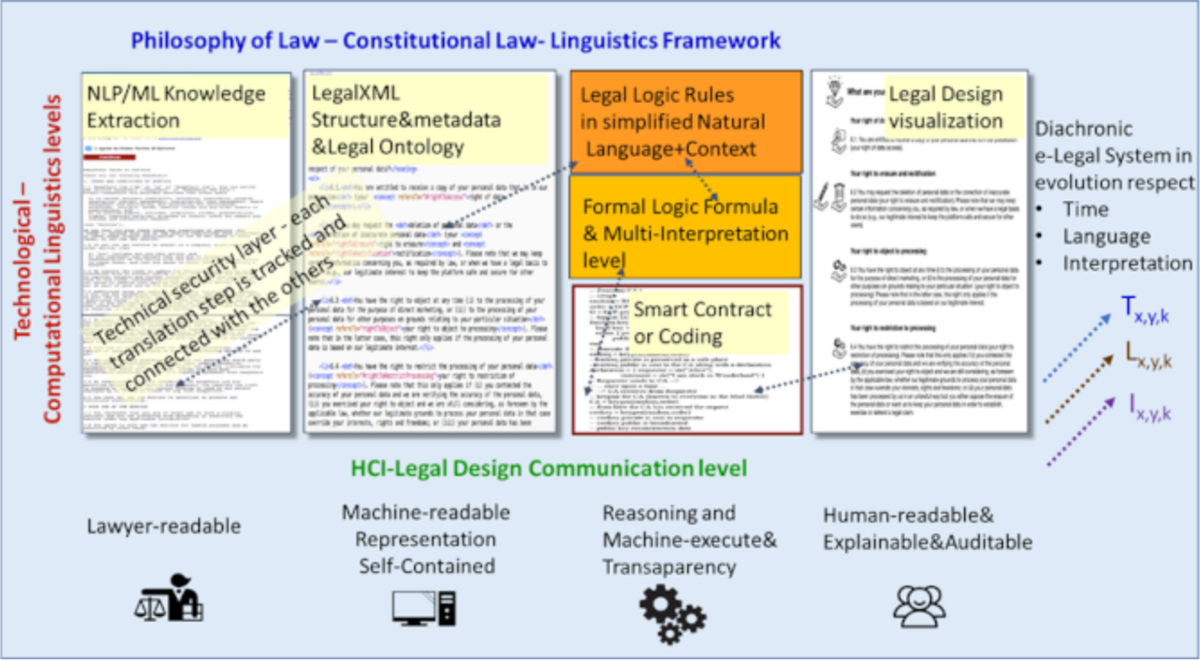Detailed description of the project: methodologies, objectives and results that the project aims to achieve and its interest for the advancement of knowledge, as well as methods of dissemination of the results achieved.
In the last two decades, legal institutions have leveraged technologies like databases, XML, and AI to manage legal sources effectively. Standards such as Akoma Ntoso XML and AKN4EU have been adopted by global organizations like the United Nations and the EU. Semantic web models and AI have been used for tasks such as multilingualism and information retrieval. While some focus on logic-based formalisms, others employ machine learning and natural language processing for legal analysis. The emerging "Rules as Code" (RaC) movement proposes algorithmic law writing to streamline legislation and reduce errors. However, RaC faces challenges in integrating legal theory, linguistic principles, and non-textual normativism. There's a need to develop a comprehensive theoretical framework to address these issues and shape the future of digital legal systems.
SLOTS aims to define legal and technical models for developing computable informatics legal systems based on the state of the art in legal informatics, computer science and Legal Language, but compliant by-design with theory of law, philosophy of law, constitutional and parliamentary principles. As the codification of the law becomes a reality, we should define the boundaries perimeter of this phenomenon tendency by considering of the philosophy of law, of the constitutional law and by in meantime to using at the maximum of the benefits provided by the AI, Semantic Web and smart contracts. This is an urgent task in the current digital and knowledge society. Otherwise, non-skeptical technocratic solutions may arise, often promoted by Big Tech or private companies and to preserve eroding pillars of the democratic societies, together with the Rule of Law core-concepts and, the institutionalism system.

We want to define legal and technical models for developing computable informatics legal systems compliant by-design with the theory of law. Legal formalism and logic- positivism (reductionism and textualism), used for decades, are not totally satisfactory for coding law resilient to changes and to incorporate the digital innovation. There is the necessity to maintain flexibility to make coding applicable to different jurisdictions, contexts, historical periods, changes in society. Neither the opposite radical legal hermeneutic nor subjectivism, used in the legal area, are good approaches for the Web of Data. For this reason, this project is ground-breaking because nowadays the mentioned communities are silos, and nobody is interested in finding a new innovative structure that conciliates legal theory/philosophy of law disciplines with emerging technologies that are deeply modifying the current society. Because the topic is crucial, we must fight the non-skeptical and simplistic technocratic approach that generates a great risk for our democratic legal system. We want to create a theoretical solid framework of models related to the "Law as Platform" phenomena, that is the robotisation of the Law through machine-consumable formats, like coding or smart contracts. To be sustainable, such a framework must be compatible with constitutional law, the theory of law and democracy systems using different disciplines including philosophy of law, legal informatics, Legal Language, thus fostering a plurality of perspectives.
To do this, the project develops two complementary aspects. Firstly, it will enhance the comprehensibility of the legal message in line with the computational approach. We will propose a new layered structure of drafting legislative acts, tailoring each individual part of the text to the differentiated categories which compose the target audience of the measures (lay user, social and economic operator, legal specialist, public administration in charge of operationalize it). The improvement of the quality of legislation will be fostered through the constitutional advice delivered in the pre-legislative scrutiny aiming at checking the compliance of the bill with the principles of the rule of law.
